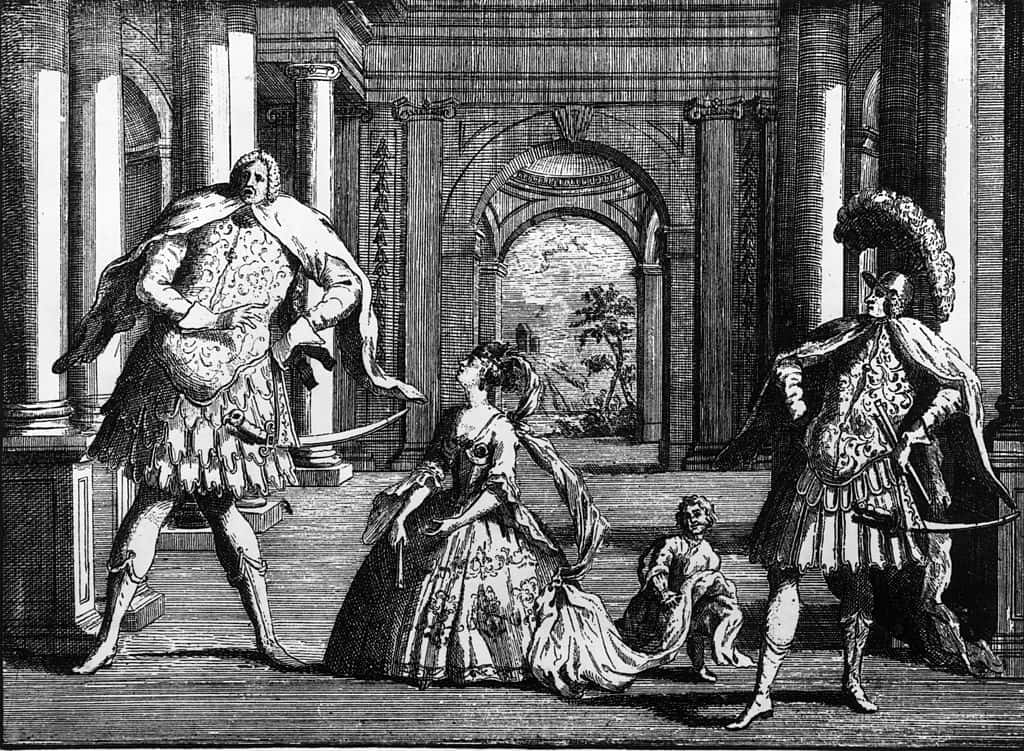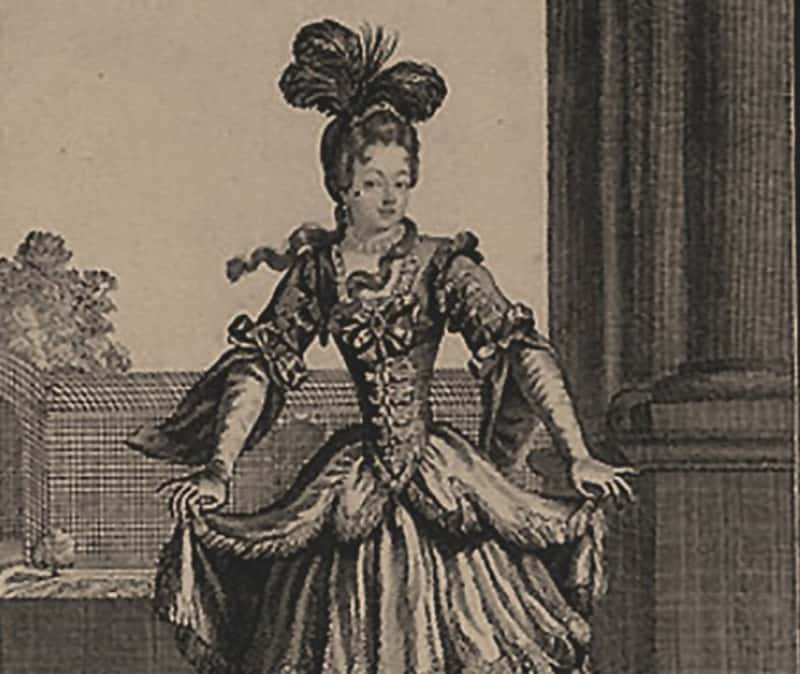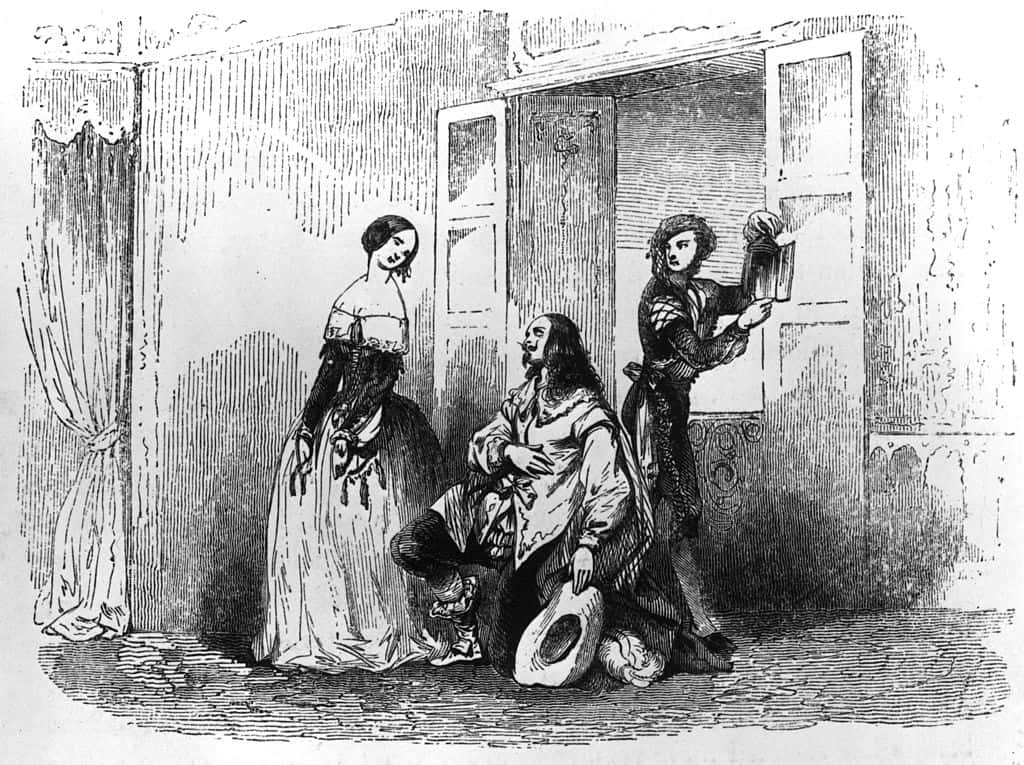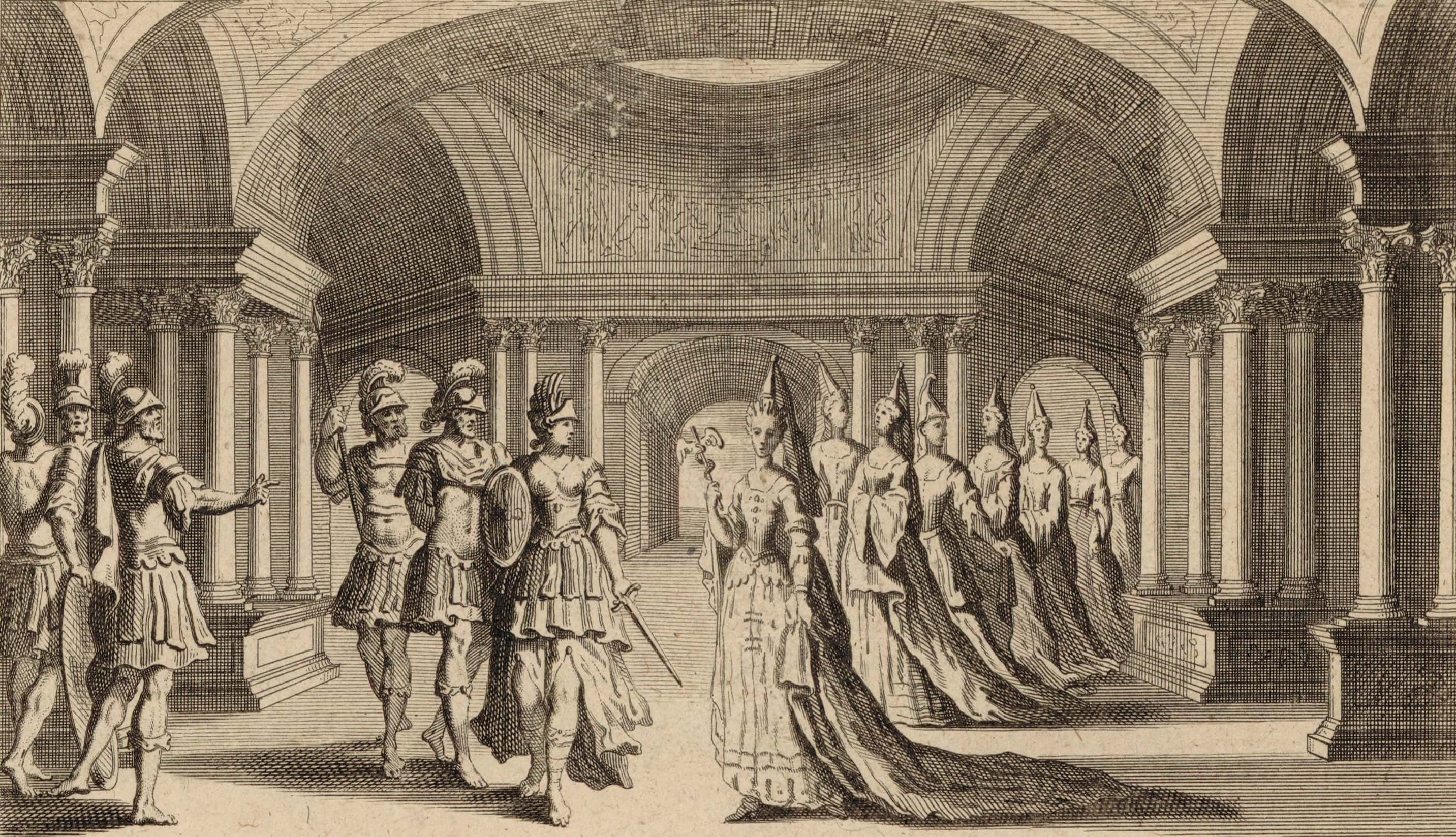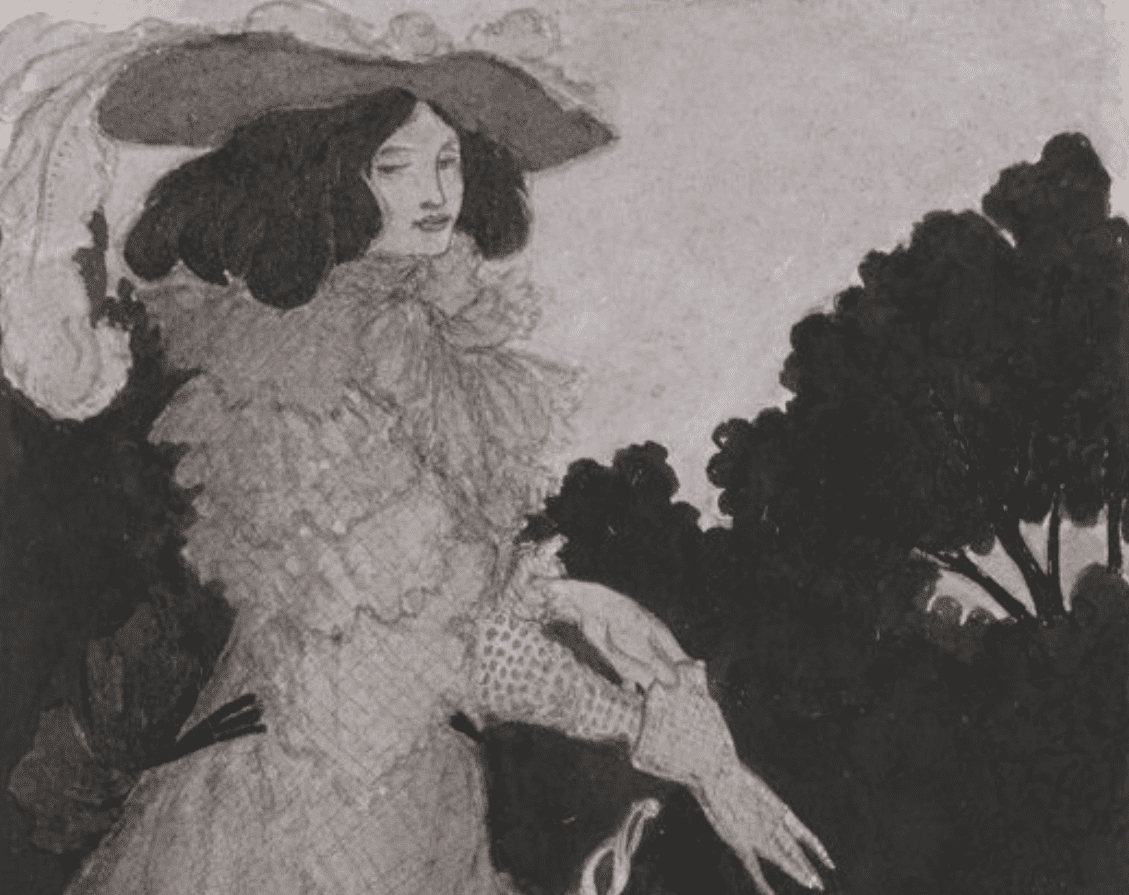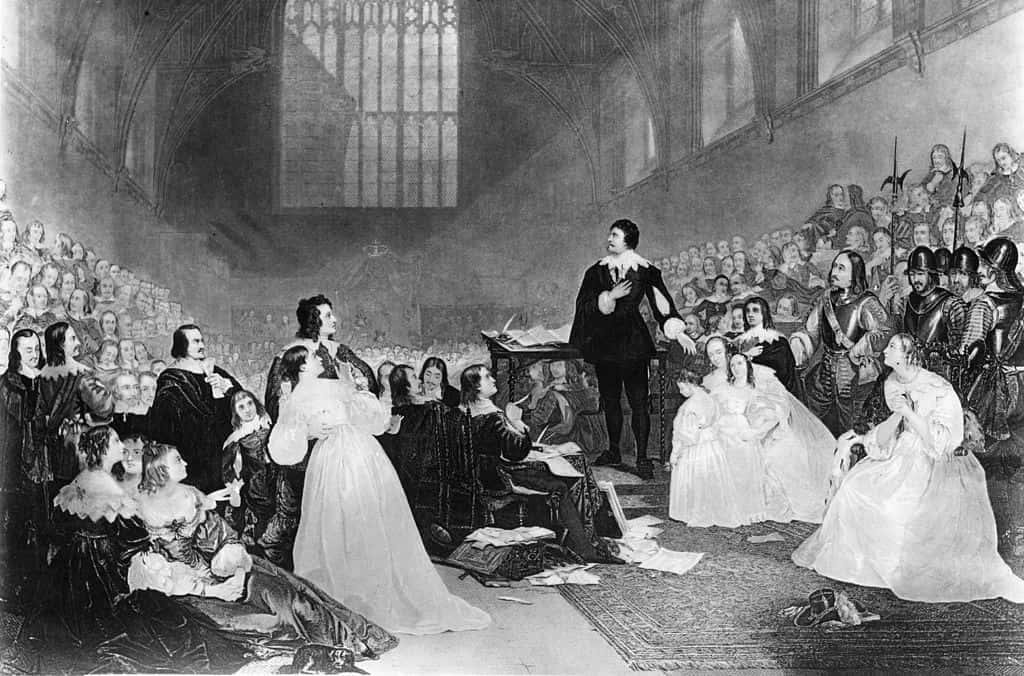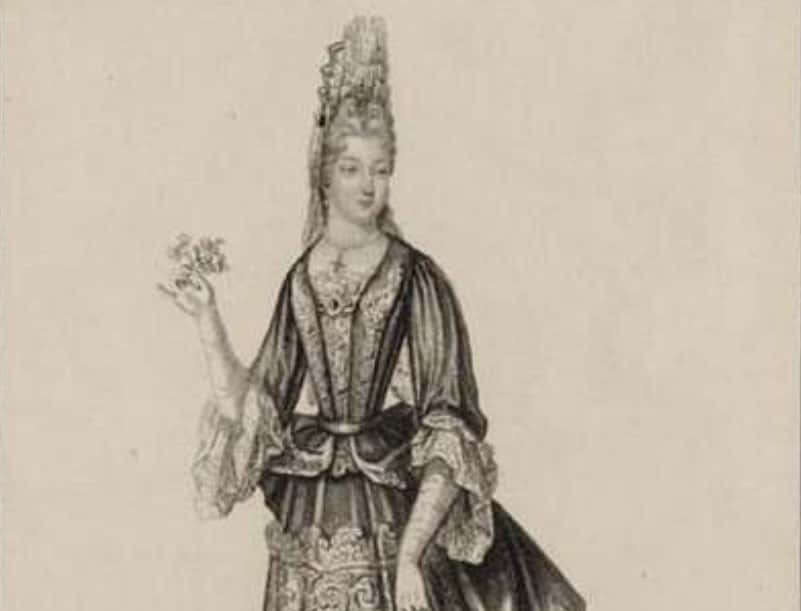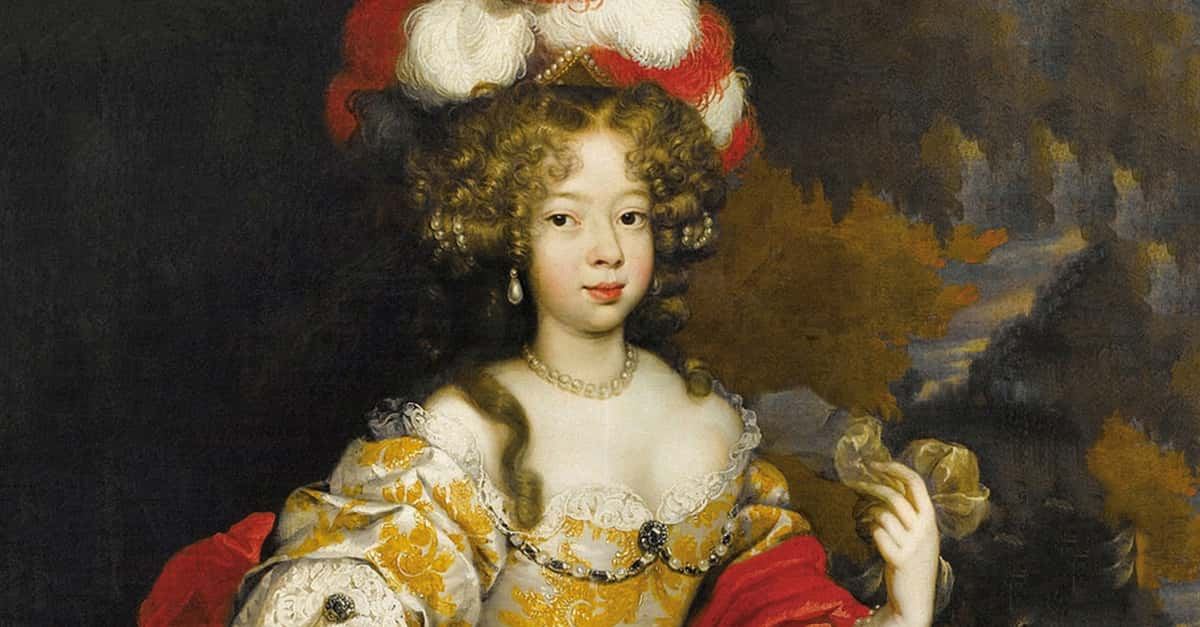Whoever said that swordfighting back in the day was just for men never met Julie d’Aubigny. This 17th-century woman lived a life so extraordinary, legends were being told about her while she was still alive. So what inspired this legacy? Who was this remarkable woman? Find out more below.
1. Where Did You Come From, Where Did You Go?
We don't know much about d'Aubigny's birth. What year she was born in is disputed amongst historians, but most experts guess 1673. We also don’t know exactly where she was born, either, though it was likely in France.
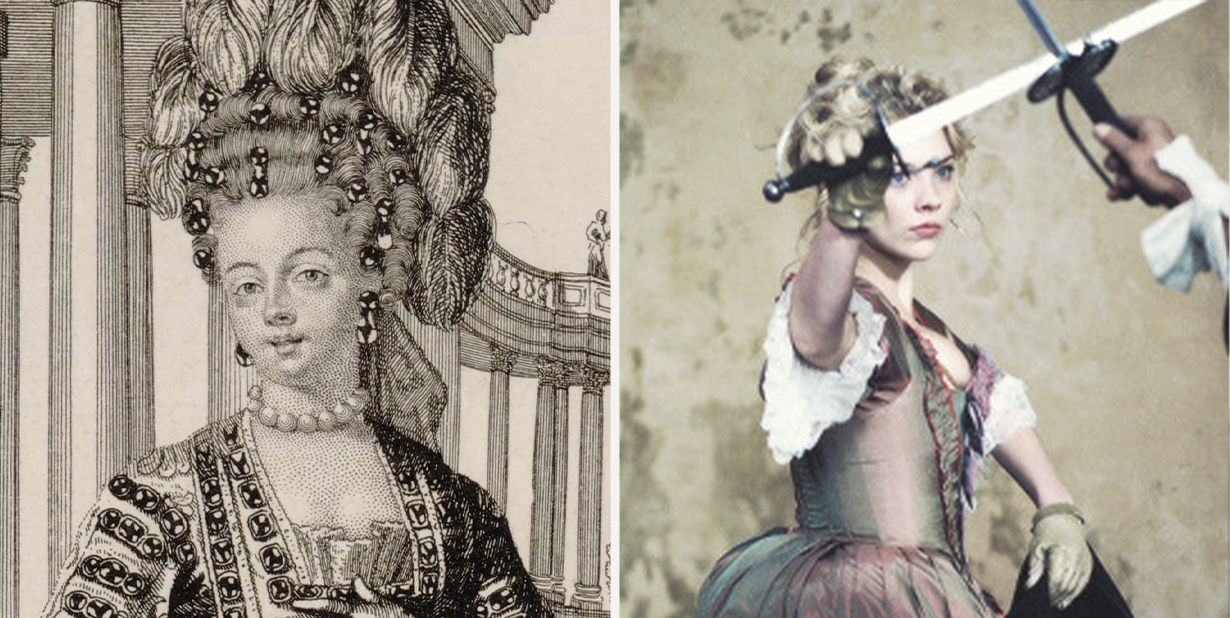
2. Maybe She’s Still Alive?
Just as we know very little about her birth, we know even less about her demise. Some historic biographers have offered their two cents, claiming that d’Aubigny ended her days in a convent. Yet because she was a woman who defied any and all conventions of her day, lots of judgment is cast on her by her early biographers, and not all of it can be trusted.
One wrote that she perished distraught at her terrible sins, and after her passing, she was “cast upon the rubbish heap". Well, that sounds completely objective and unbiased.
 Madamigella di Maupin (1966), Jolly Film
Madamigella di Maupin (1966), Jolly Film
3. Connections
Julie's father, Gaston d’Aubigny, worked as a secretary to Louis of Lorraine. Louis was not only the Count of Armagnac, he was also known as the Grand Squire of France. This meant that Louis was based at France’s royal court, managing the Royal Stables, which at the time was nothing to sneeze at.
4. Arya Stark, Is That You?
Because her father was responsible for training the court pages, d’Aubigny managed to get the same education as these boys, despite being a girl. Aside from dancing, d’Aubigny also learned how to read, draw, and fence with swords—which she got very good at. We can only assume that she nicknamed her fencing sword “Needle".
 Julie de Maupin - Spectacle musical (2017), Pierre Siksik, Association Fortuna
Julie de Maupin - Spectacle musical (2017), Pierre Siksik, Association Fortuna
5. How Do You Pronounce That?
Julie d’Aubigny’s was married young, to the Sieur de Maupin of Saint-Germain-en-Laye. Following her wedding, French customs meant that d’Aubigny was often known as either Mademoiselle Maupin or simply "La Maupin".
 Julie de Maupin - Spectacle musical (2017), Pierre Siksik, Association Fortuna
Julie de Maupin - Spectacle musical (2017), Pierre Siksik, Association Fortuna
6. All at Once or One at a Time?
In 1695, d’Aubigny attended a society ball where a beautiful woman caught her eye. She proceeded to kiss the lady, much to the shock and outrage of three noblemen who had their own eyes on said lady. All three of these men, feathers all ruffling, challenged d’Aubigny to duels. The master swordswoman happily accepted.
Of course, she then beat all three of them.
 Madamigella di Maupin (1966), Jolly Film
Madamigella di Maupin (1966), Jolly Film
7. Figaro!!
In addition to all her other accomplishments, d'Aubigny was also an extraordinarily diverse opera singer. She not only sang soprano (the highest pitch for a female singer) but also contralto (the lowest pitch). She would alternate throughout her career, going from high to low depending on which opera she was performing in.
 Julie de Maupin - Spectacle musical (2017), Pierre Siksik, Association Fortuna
Julie de Maupin - Spectacle musical (2017), Pierre Siksik, Association Fortuna
8. Surprise!
During her time putting on fencing exhibitions, d’Aubigny was once challenged by a spectator on her gender. The man claimed that no woman could be as skilled with a sword as d’Aubigny was. Wasting no time, d’Aubigny took off her top and flashed the crowd to prove that even though she was wearing men’s clothes, she was definitely a woman.
 Julie, chevalier de Maupin (2004– ), Alma Productions
Julie, chevalier de Maupin (2004– ), Alma Productions
9. As Played by…
Sarah Biasini, daughter of acclaimed French film actress Romy Schneider, made her own debut in the 2004 film Julie, Chevalier de Maupin. As you’ve probably guessed by now, she starred as d’Aubigny in what was described as “a swashbuckling adventure story". No doubt d’Aubigny would have liked that.
 Julie, chevalier de Maupin (2004– ), Alma Productions
Julie, chevalier de Maupin (2004– ), Alma Productions

Sign up to our newsletter.
History’s most fascinating stories and darkest secrets, delivered to your inbox daily. Making distraction rewarding since 2017.
10. Maestro!
The majority of operas d’Aubigny performed in were composed by André Campra, a gifted opera composer who was one of the major talents of his era. Although Campra wasn’t always comfortable financially, his operas and other musical pieces were very popular among the fashionable set. Campra worked in various cathedrals as a music director before finding work at Versailles.
He would work at Versailles until his demise there, in 1744.
11. Queen of the Pranks
During one of her many travels across Europe, d’Aubigny ended up briefly relocating to Madrid. In slightly humbler surroundings, she became a maid to the Countess Marino. When the countess proved to be a pretty unlikable boss, d’Aubigny showed her disapproval when the noblewoman was preparing to go to a grand ball.
The countess didn’t notice, but everyone who looked at her was able to see several radishes placed in her elaborate hairdo! Safe to say, d’Aubigny wasn’t around when the countess did find out.
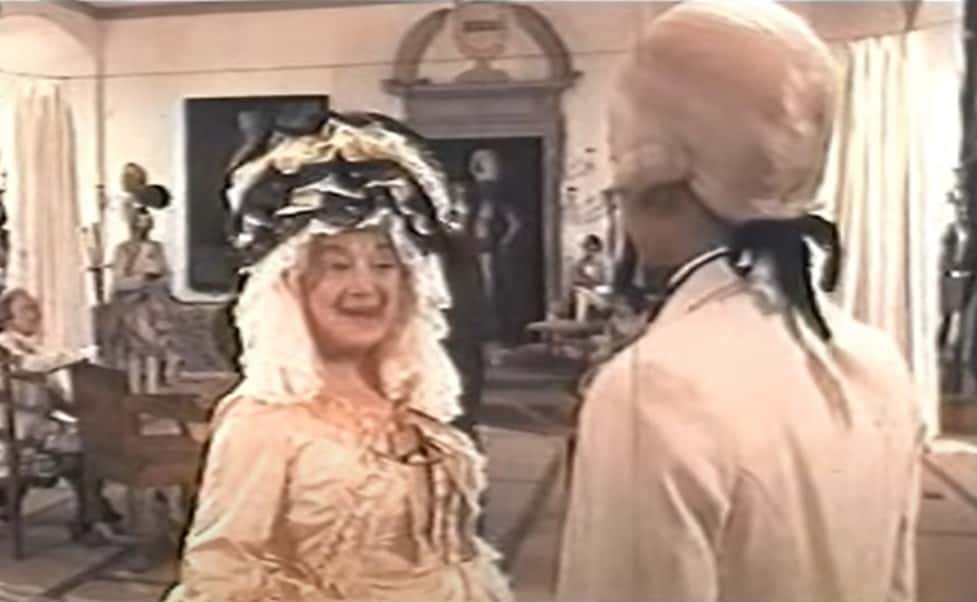 Madamigella di Maupin (1966), Jolly Film
Madamigella di Maupin (1966), Jolly Film
12. Where Are the Royalty Checks?
In the late 20th century, Henri Evans wrote two books about d’Aubigny’s illustrious life. The first book, Amand, was published in 1980, while its sequel, La Petite Maupin, came out in 1985.
13. It’s a Living
Because this was the 17th century, when Julie d’Aubigny and her fugitive lover, Serannes, were fleeing from the authorities after a duel gone wrong (more on that later), they didn’t have to flee France entirely to avoid being targeted by the authorities. The two of them traveled the French countryside, supporting themselves by displaying their fencing skills or by singing songs for tips.
 Madamigella di Maupin (1966), Jolly Film
Madamigella di Maupin (1966), Jolly Film
14. The Roaring Girl
It was during this time as a vagabond that d’Aubigny first began to wear men’s clothing—however, she did this without pretending to be a man or concealing that she was a woman.
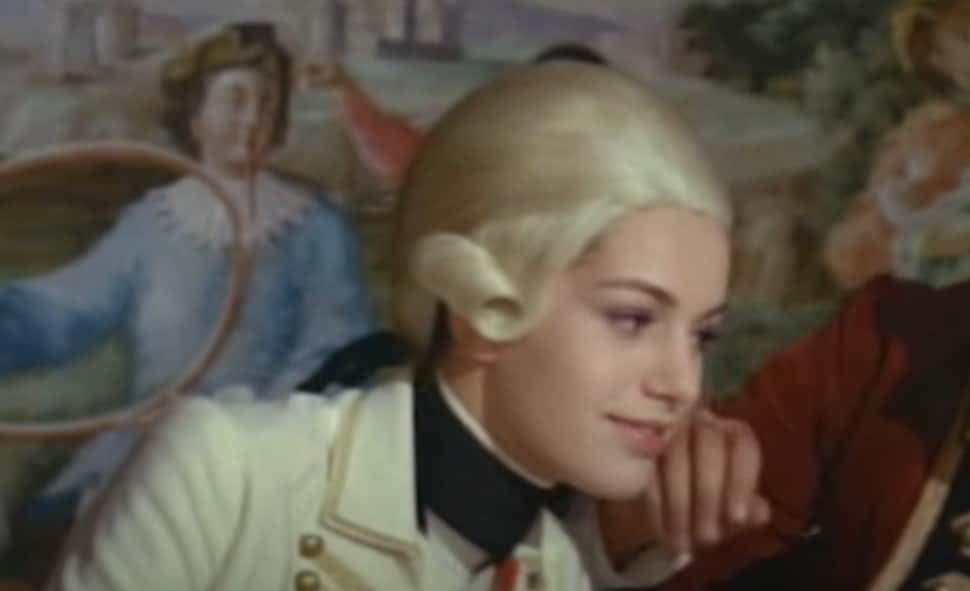 Madamigella di Maupin (1966), Jolly Film
Madamigella di Maupin (1966), Jolly Film
15. Merci, Joan
While you might wonder how French society didn’t burn d’Aubigny as a witch, keep in mind that there was actually a precedence for this. Ever since Joan of Arc, there was a romanticized idea of female warriors in French history. Granted, d’Aubigny wasn’t just controversial for wearing men’s clothes, but it goes a long way to explain how she was able to continue being who she was in such a suffocating time for women.
16. A Woman for My Heart
During her career as an opera singer, d’Aubigny fell head over heels in love with Fanchon Moreau, a renowned soprano with whom she worked on the opera Didon. Moreau was as famous as an opera singer could be in those days, and was said to be incredibly beautiful. As often happens when fame and beauty collide, Moreau's love life was the source of much gossip.
Rightfully so: Moreau was mistress to none other than the Grand Dauphin, the heir to the French throne.
17. Goodbye, Cruel World
Sadly, for d’Aubigny, Fanchon Moreau wasn’t receptive to her advances, and she rejected her. Such was d’Aubigny’s despair at the lost love match that she tried to take her own life. Thankfully, like her pass at Moreau, this attempt was unsuccessful.
18. Breaking Into the Business
The first time d’Aubigny tried her hand at opera singing was during her adventures on the run with Serannes. She eventually settled down in Marseilles to sing under her maiden name, presumably because meeting her husband would just be really awkward for both of them by that point.
19. So, She Was a Tully?
According to contemporary sources, d’Aubigny had bright blue eyes and dark auburn hair.
 Madamigella di Maupin (1966), Jolly Film
Madamigella di Maupin (1966), Jolly Film
20. We’re Not Having This!
Despite the fact that she’d gone on the run with him, d’Aubigny got tired of Serannes, and soon abandoned him in favor of a new love interest. A noblewoman whose name is lost to history became infatuated with her after seeing her at the opera house in Marseilles, and the two women embarked on a passionate affair.
Unfortunately for her and d’Aubigny, the noblewoman’s family was shocked by this development, and sent their daughter to a convent in Avignon.
21. This Is Just Tuesday
At one point in her life, d’Aubigny was put on trial for physically assaulting her landlord. It speaks volumes that this is only a minor part of her story.
 Julie, chevalier de Maupin (2004– ), Alma Productions
Julie, chevalier de Maupin (2004– ), Alma Productions
22. Girl Power
During her time as a high-ranking opera singer, d’Aubigny did more than win crowds over with her vocals: She also set herself up as a defender of chorus girls from the attention of lusty noblemen looking to take advantage of their wealth and position to prey on lower-class women. But it wasn’t just the nobles she was on guard against.
One of the most well-known stories about her life involved her physically chastising the singer Louis Gaulard Dumesny when he would not stop harassing the women of the opera company.
23. You Could Have Just Said Miss
You might be wondering why d’Aubigny, a married woman, was known as Mademoiselle de Maupin. The answer probably isn’t what you’re suspecting, though. During that time in the French opera scene, it was the custom to address all female opera singers as “Mademoiselle,” no matter what their marital status was.
 Julie, chevalier de Maupin (2004– ), Alma Productions
Julie, chevalier de Maupin (2004– ), Alma Productions
24. If the Shoe Fits
The first show that d’Aubigny performed with the Paris Opera was titled Cadmus et Hermione, inspired by the famous Greek myth. Debuting in 1690, d’Aubigny performed in the role of the Greek goddess of wisdom and war known as Pallas Athena. It was certainly a fitting role for the sword-wielding woman.
25. Sugar Daddy
During one of her exiles in Brussels, d’Aubigny briefly became the mistress of royalty. The royalty in question was Maximilian II Emanuel, an esteemed prince of the Holy Roman Empire.
26. That’s Our Lady
Despite her frequent duels, her defiance of the patriarchy, and her openly wearing men’s clothes on a regular basis, d’Aubigny remained highly popular among commoners and nobles alike. This may have played a role in her being pardoned so many times for her transgressions.
27. Swan Song
The last time that d’Aubigny appeared onstage was in 1705. She sang in Michel de La Barre’s La Venitienne.
28. Unconventional Romance
Over a century after d’Aubigny’s passing, French author Theophile Gautier was compelled to write about her. Rather than write a straight biography, he produced the quasi-fictional Mademoiselle de Maupin. Released in 1835, the book borrows names and a few aspects of d’Aubigny’s life, but ultimately becomes a far-fetched romance novel, just with cross-dressing and bisexuality thrown in. As you can imagine, Gautier drew a lot of controversy for his novel, and the book was banned by several authorities.
29. Historically Accurate?
Speaking of the book loosely based on d’Aubigny by Gautier, that book formed the basis for the 1966 French film Madamigella di Maupin. The film starred French actress Catherine Spaak as the titular character, which no doubt frustrated all the British or American actresses that Hollywood would have cast in the role!
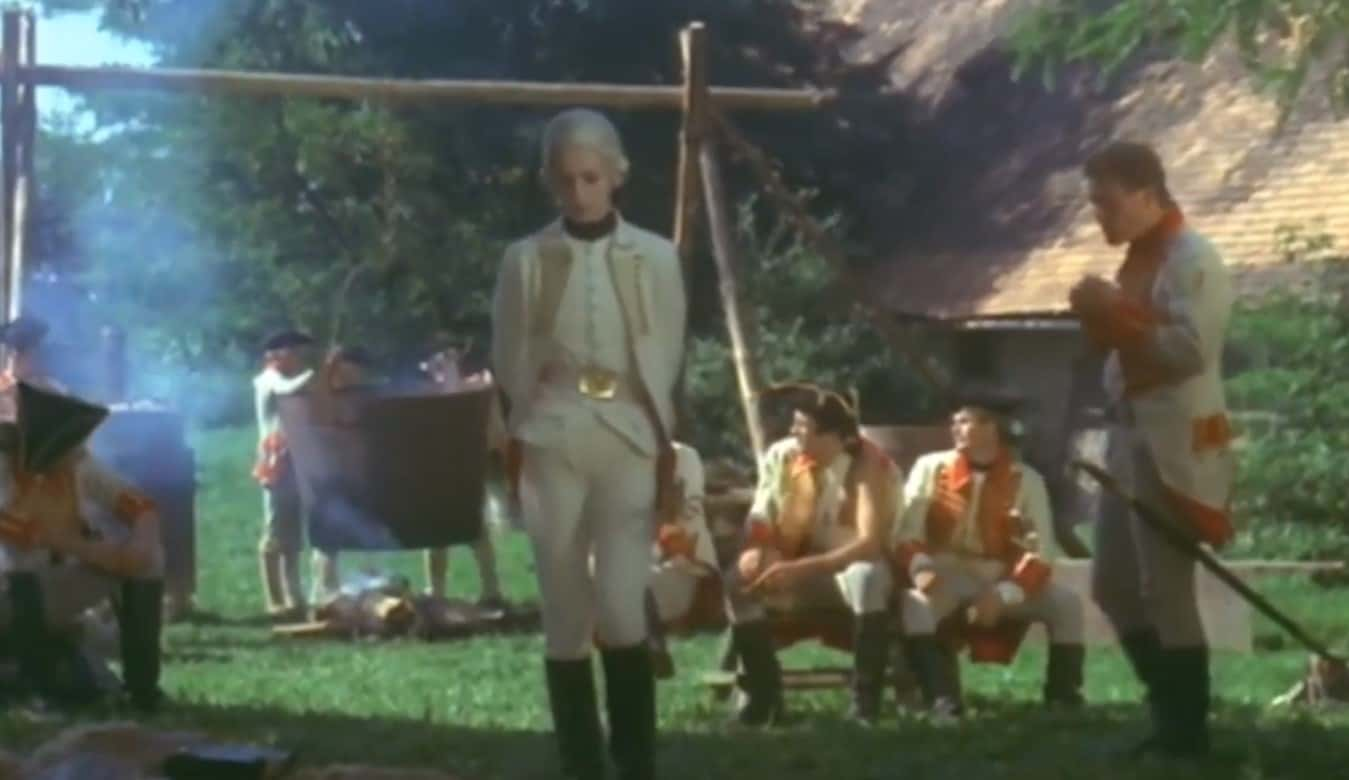 Madamigella di Maupin (1966), Jolly Film
Madamigella di Maupin (1966), Jolly Film
30. Indie Success
Not surprisingly, d’Aubigny’s life story has inspired a musical, La Maupin.
31. Challenge Accepted
If anyone thought d’Aubigny would let a few nuns get in the way of her and a woman she loved, though, they were sadly mistaken. Posing as a hopeful novice nun, d’Aubigny joined her girlfriend and came up with a disturbing plan to get her out. Upon the passing of an elderly matron, the two girls put the lifeless body in their bedroom and set the room on fire.
This way, it looked like the noblewoman-turned-nun had perished in a freak accident, and both women made their escape.
 Madamigella di Maupin (1966), Jolly Film
Madamigella di Maupin (1966), Jolly Film
32. Was Frollo the Judge?
Ridiculously enough, there happen to be consequences for lighting a nunnery on fire and faking your girlfriend's demise. In her absence, d’Aubigny was put on trial—as a man, naturally—for the offenses of kidnapping, body snatching, and arson. After skipping town, she was then also charged with failing to appear at her own trial.
When all was said and done, d’Aubigny was (quite ironically) sentenced to die by fire.
33. All’s Well That Ends Well
As you’ve probably guessed by now, d’Aubigny did not end up getting burned at the stake in a tragic turn of events. This was because she contacted her former lover, the Count of Armagnac, and persuaded him to get her pardoned by the King of France himself. Somehow, Armagnac managed to persuade the king to do just that.
34. Time to Hit the Dusty Trail Again…
Despite her triumph in this three-part duel, d’Aubigny was once again in hot water with the authorities. The royalty had forbidden duels within Paris, so she had to take an extended vacation to the Belgian city of Brussels until things blew over.
35. Lovers in a Dangerous Time
The tempestuous love life of d’Aubigny struck again in 1703 when she fell head over heels in love with “the most beautiful woman in France". This woman was the Marquise de Florensac, and she attracted plenty of attention thanks to her good looks. In fact, the Grand Dauphin himself had his eye on Florensac, meaning that d’Aubigny was literally competing with royalty for Florensac’s affections.
This time, D'Aubigny came out on top: the Marquise returned her affections, and no tragic dramatics were required.
36. Happiness Is Fleeting
Despite d’Aubigny successfully wooing the Marquise de Florensac, both women had to flee France to escape the wrath of the Grand Dauphin. According to one account, the lovers settled in Belgium and had two happy years together.
37. All Good Things Come to an End
Sadly, those two years were all the lovers had, and then Florensac passed on. Wracked with grief, it's said that d’Aubigny went into a convent to retire from public life. She, too, perished soon after. She was only 33—but she had already lived the life of someone three times her age.
 Julie, chevalier de Maupin (2004– ), Alma Productions
Julie, chevalier de Maupin (2004– ), Alma Productions
38. Creepy Romance
When d’Aubigny was just 14 years old, she was taken to be the mistress of her father’s boss, the Count of Armagnac. Disturbingly, even when the Count arranged for d’Aubigny to be married, he made sure that her husband was given a job all the way down in the south of France—while Julie stayed in Paris with him.
 Wikipedia
Wikipedia
39. Are You Sure He Wasn’t Called Syrio Forel?
At the same time that d’Aubigny was both the mistress of the Count of Armagnac and the wife of Maupin, she was actually having yet another affair. In this case, it was with a fencing instructor named Serannes.
 Madamigella di Maupin (1966), Jolly Film
Madamigella di Maupin (1966), Jolly Film
40. Romantic Getaway?
Remember, by the time that d’Aubigny was a teenager, she was having two affairs outside of her marriage. This was all a bit much for one girl to handle, even if that girl was Julie d'Aubigny. It all came to a head around 1687, when d'Aubigny's lover Serannes was targeted by law enforcement for participating in an unlawful duel.
Granted, the authorities had good reason: Serannes had slain a man in the conflict. Fearing for his life and livelihood, Serannes fled from Paris—taking d’Aubigny with him on the run.
 Madamigella di Maupin (1966), Jolly Film
Madamigella di Maupin (1966), Jolly Film
41. Them’s Fighting Words
One of the most famous anecdotes about d’Aubigny is when she found herself in the town of Villeperdue. She was still wearing men’s clothes at the time, and she drew the ire of a young man, Louis-Joseph d'Albert Luynes, the son of a Duke. After she got sick of his insults, she challenged Louis-Joseph to a duel.
It was over before it started: She swiftly thrust a sword into his shoulder, and the nobleman admitted defeat.
42. On Second Thought
Of course, this triumphant duel wouldn’t be half as memorable without the crazy epilogue attached to it. After the duel, while Louis-Joseph was healing from his injury, he sent one of his friends to apologize to d’Aubigny on his behalf. D’Aubigny must have really appreciated him eating his words, because she later visited him in his quarters.
One thing led to another, and soon enough d'Aubigny was his lover. In fact, the two of them remained lifelong friends after that. Who knew dueling brought enemies so close together?
 Madamigella di Maupin (1966), Jolly Film
Madamigella di Maupin (1966), Jolly Film
Sources: 1, 2, 3, 4, 5, 6, 7, 8, 9, 10, 11, 12, 13, 14, 15, 16, 17






